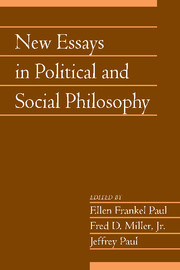Book contents
- Frontmatter
- Contents
- Introduction
- Acknowledgments
- Contributors
- Political Liberty: Who Needs It?
- State Coercion and Force
- Political Legitimacy and Economic Liberty
- Who Owns What? Some Reflections on the Foundation of Political Philosophy
- Human Reproductive Interests: Puzzles at the Periphery of the Property Paradigm
- Why Free Trade is Required by Justice
- Structural Exploitation
- Rescuing Justice from Equality
- Reinterpreting Rawls's The Law of Peoples
- Responsible Choices, Desert-Based Legal Institutions, and the Challenges of Contemporary Neuroscience
- Genocide and Crimes Against Humanity: Dispelling Some of the Conceptual Fog
- Harm and the Volenti Principle
- Education and the Modern State
- Index
Introduction
- Frontmatter
- Contents
- Introduction
- Acknowledgments
- Contributors
- Political Liberty: Who Needs It?
- State Coercion and Force
- Political Legitimacy and Economic Liberty
- Who Owns What? Some Reflections on the Foundation of Political Philosophy
- Human Reproductive Interests: Puzzles at the Periphery of the Property Paradigm
- Why Free Trade is Required by Justice
- Structural Exploitation
- Rescuing Justice from Equality
- Reinterpreting Rawls's The Law of Peoples
- Responsible Choices, Desert-Based Legal Institutions, and the Challenges of Contemporary Neuroscience
- Genocide and Crimes Against Humanity: Dispelling Some of the Conceptual Fog
- Harm and the Volenti Principle
- Education and the Modern State
- Index
Summary
Aristotle expressed the view that the political state exists by nature because human beings are political or social by nature. Thomas Hobbes maintained on the contrary that the political commonwealth arises from an artificial covenant, whereby a multitude authorizes a sovereign to rule over it. Whether it is a result of nature, the consequence of a choice to escape the state of nature, or the outcome of some other process of deliberation, the fact of human association gives rise to recurrent themes in political and social philosophy. The character and requirements of justice, the profile of political legitimacy, and the relationship between the powers of government and the rights of the governed are some of the subjects of ongoing consideration and debate in the disciplines of philosophy, political theory, economics, and law. This volume represents a contribution to the investigation of these issues of perennial interest and import, featuring essays whose authors hope to extend, deepen, and, in some cases, move in new directions, the current state of discussion.
The thirteen essays in this collection explore the foundations of political association, the nature of justice, and the character of the rights and liberties that individuals enjoy by virtue of membership in civil society. Some identify and examine misconceptions common in current thinking among political philosophers and laypersons alike. Some seek to clarify the role played in theory and in policy by concepts prominent in political thought such as ownership and property, or those perhaps less well entrenched, such as exploitation and genocide. Others propose new understandings of the work and influence of political philosophers, such as John Rawls, whose ideas are prevalent in ongoing debates.
- Type
- Chapter
- Information
- New Essays in Political and Social Philosophy , pp. vii - xvPublisher: Cambridge University PressPrint publication year: 2013

